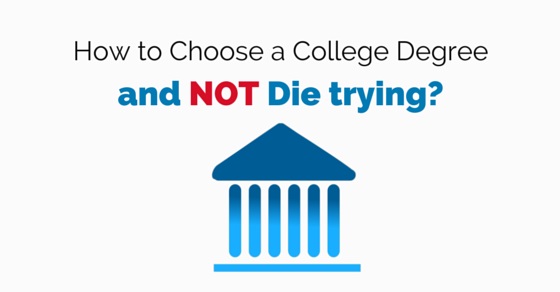Picking what to study after high school is hard. Very, very hard. You are, after all, around 17, and being expected to plot out the course of your entire future. Meanwhile, very little of the career advice you’re getting consists of how to make that choice.
Most of the people you’re talking to are telling you what fields help make a living, how long to work, what competitive exams to give and just about everything except actually giving you the tools to make your own choices.
Things to Consider When Choosing a Major:
To them, choosing the right college means ranks and placements, leaving faculty choices, internship opportunities, peer groups and all of the other factors that make college significant to your life, out in the rain.
Today’s ever-changing market means that most careers are predicted by as much by your abilities and experiences as by the brand name college you went to or your super popular major. Want to figure out how to figure out your way to that dream career? Keep reading.
1. Try Things:
Whether your raison d’être is library science or computer programming, the internet makes it so much easier for you to dip your toes or even take a deep dive. Reinforce your knowledge through practice and study. Figure out not only if that area of study is made for you, but also if you’re made for it.
2. Stay Au Courant:
School books, no matter which country you live in, can never be what informs your interest. Look to the internet, news, journals, and other publications to keep up with what’s happening with the fields you’re interested in – what are the latest developments, the job scene, the future prospects and so on and so forth.
3. Get Friendly:
Here’s a secret: grown-ups love talking about their work, and they love talking to seemingly interested kids. Whatever the field you like, plenty of people who make up the workforce will be glad to respond if you reach out. Raid alumni lists, join forums, look for people who know people who know people who… you get the drift.
4. Think About The Monnay!
College is expensive, and unless you live in a socialist’s dream of a country, somebody has made some sacrifices for you to be going to college – sacrifices that they might want to see redeemed in the form of a lucrative future.
You don’t even have to go so far as to pick a major based on how much graduates are making on average. You do, however, need to look into how the money flows in the field of your choice, and how you can maximize the chances of success.
5. Get Out In The Field:
Did you know that several of the world’s biggest research centres have internships for school kids? The job market is slowly but surely innovating to allow enterprising young people to try out their chops before committing to a degree.
Look for internships, look for part-time employment or even volunteer work. The Force helps those who help themselves.
6. Visit Colleges:
Look out for open days at colleges. Go badger professors, visit placement cells yourself, ask questions, and check out infrastructure. Most, importantly, look at how the stream of your choice is at that university when you compare colleges.
Make a list of college names, fees, aid opps, academic requirements and available majors. Cross out most of them, and leave yourself with a final six that you will apply to for sure.
Stumped By Majors? Ways to Pick Right Majors:
Let’s go over the futures that might await you with some of the more popular fields to learn and why you would want to study them.
1. Humanities (aka the Liberal Arts):
Graduates generally end up in the civil services, but, shockingly enough, more than 30% of Fortune 500 CEOs are Liberal Arts majors. Other likely careers for Humanities grads are journalism, teaching, publishing, writing, psychology, etc.
Liberal Arts grads are also surprisingly valuable in managerial posts. The dry run the job scene world is having with language skills sure comes in handy when its time for a Humanities grad to look for a job.
2. Science (aka… Science?):
RnD, Quality Control, teaching, regulation bodies, science communication, and most importantly, a shot at a Nobel for science – Science Majors have no shortage of job prospects, prospects that can be bettered by taking the next step and getting a Masters. While Science might be comfortable, it is definitely no…
3. … Engineering and Technology:
As if you’ll have to look. The way college recruiters talk, every single employer on this planet wants to employ you, whether or not they need a tech major. Seriously, though, for an employee shortage projection past 2020, go for Electrical Engineering.
4. Business:
Technically, you can work just about anywhere. It’s right there in the name. Just about any place that hires people or makes money or gives out money or makes things or sells things or provides services – needs people with business acumen. This knowledge is invaluable, and business degree holders are the highest earners after medical and engineering grads.
5. Medicine:
This is one field that offers the pinnacle of both personal and professional enrichment. You get to help people and save lives, and, on average, be the highest paid people wherever you live. People will always need doctors, at least until the robots take over.
6. Architecture:
Architecture is a field that can be as creative as it is technical. It requires managerial skills too. It can be highly rewarding for those who are interested in and offers a lot of room for self-employment as well. Also, you get to make things that a lot of people will use for a very long time, and that’s pretty awesome.
Choosing a college degree is important in that what is critical to your future tends to be how you did in college rather than what. Unless it is specific fields which require “professional” degrees, employers are on the lookout for people who did well at whatever they did in college, as that is something that shows dedication and interest – two things that most companies can never do with enough of.
Author Bio: This is a Guest Post by Kelly Brooke. Hi, I am 26. I finished my master’s degree in Mass Communication this academic year, post which I accepted a job at Univariety. I studied at St. Francis College for Women, Hyderabad, India. I enjoy writing about just about anything, and find the vagaries of education and admissions frankly fascinating.











































